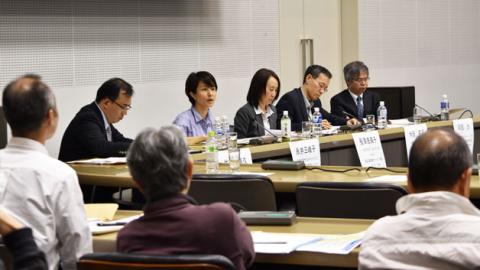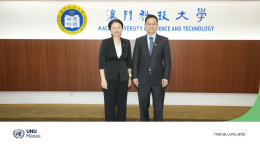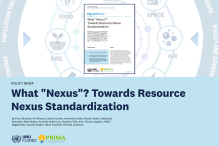
On 12 October 2016, on the occasion of its twentieth anniversary, the Global Environmental Outreach Center (GEOC) hosted the UNU-IAS SDG Dialogue Event GEOC 20th Anniversary Symposium on Sustainable Development Goals and Local Partnerships: GEOC and Future Partnerships. Since its establishment in 1996, GEOC has built and maintained strong partnerships with Japanese civil society and worked to facilitate connections among industry, government, academia, and the private sector.
The symposium opened with remarks from GEOC's supporting institutions with Yoshimi Okunushi (Director General, Environmental Policy Bureau, Ministry of the Environment of Japan) and Kazuhiko Takemoto (Director, UNU-IAS), reflecting on the achievements of GEOC over the past 20 years and its vital role in facilitating multi-stakeholder partnerships to resolve global challenges including the realization of the SDGs and the Paris Agreement.
In the first of two keynote lectures, Hikaru Kobayashi (Project Professor, Graduate School of Media and Governance, Keio University) explained how partnerships can bring added value that extends beyond the environmental sector. He expressed his hope that GEOC's role can be expanded in the future.
The second keynote lecture, by Norichika Kanie (Senior Research Fellow, UNU-IAS) explained the interlinked and cross-cutting nature of the SDGs. He introduced Champions 12.3, a multi-stakeholder partnership initiative led by the Netherlands, and suggested that GEOC should lead similar initiatives in the future.
The lectures were followed by a panel discussion moderated by Masahisa Sato (Professor, Faculty of Environmental and Information Studies, Tokyo City University). Discussion took place between four panelists: Osamu Abe (Director, ESD Research Center, Rikkyo University), Katsuji Imata (Co-Director, CSO Network Japan), Emiko Nagasawa (Coordinator of 1% Club, Group Head of Training, Japan Business Federation Project Service), and Mikiko Nagai (Office Manager, UNU-IAS OUIK). The speakers highlighted the importance of clarifying responsibility in multi-stakeholder initiatives, building partnerships with people who face similar issues, building youth-centered mechanisms, facilitating partnerships among coordinating agencies, and ensuring all stakeholders are on an equal footing.
The symposium closed with remarks from Tsunao Watanabe (Senior Programme Coordinator, UNU-IAS). He reaffirmed GEOC’s continued commitment in connecting local actions and global goals and creating partnerships that can change the world.
In an effort to raise the awareness of the SDGs, posters which highlight tips for applying SDGs within local communities were displayed during the symposium.



